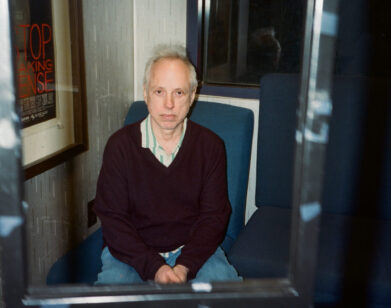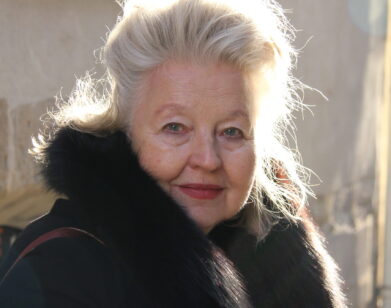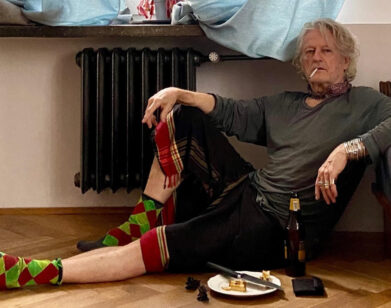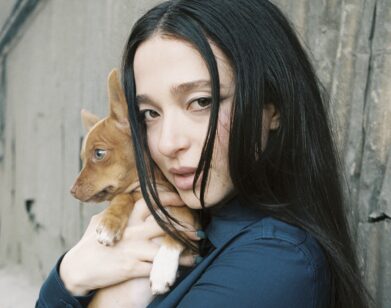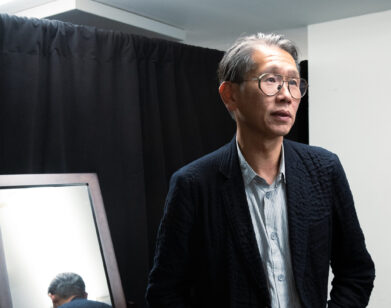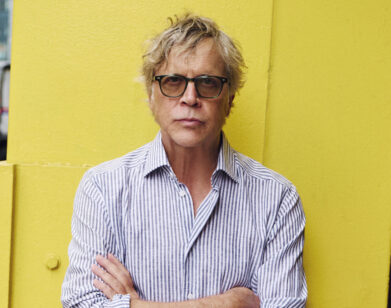NYFF
“I Like to Be Alone on Stage”: 15 Minutes With Isabelle Huppert

Isabelle Huppert, photographed by Luisa Opalesky.
MONDAY 9:42 AM OCTOBER 3, 2024 NEW YORK CITY
Few match Isabelle Huppert’s devotion to the screen and stage. Known for playing ambitious, often morally ambiguous characters with an uncanny ability to hide their emotions, the French actor is an expert in subtleties. But off-screen, she’s best described as a passionate advocate of the arts. Huppert owns two theaters in Paris, and this year, headed up the Venice Film Festival Jury for the very first time. Of course, you may remember the actor for her groundbreaking performances in transgressive dramas like The Piano Teacher and Elle, but the screen legend is equally captivating in independent, philosophical films, like her most recent collaboration with South Korean director Hong Sang-soo, whose latest film A Traveler’s Needs premiered at NYFF last week. To learn more, we met Huppert for a morning coffee at L’Alliance New York to talk ambiguity, intuition, and loneliness.
———
TAYLORE SCARABELLI: Congratulations on the film. How was the screening yesterday?
ISABELLE HUPPERT: It was great. Everybody seemed to like it a lot.
SCARABELLI: I really enjoyed the film and I thought your character was so interesting. Iris, she’s embodying the role of a teacher, but throughout the film it’s almost like, “Is she a grifter? What does she want?” And I think through this grift, through this idea of teaching, she ends up revealing a lot about the human experience. What drew you to the role?
HUPPERT: Nothing drew me to the role because there are no roles in a Hong Sang-soo film. It could be a teacher, it could be a baker, it could be whoever, it’s not really important. But that’s what I like about the process. There is no script, there is no story, there is no character. There is a place that’s very, very important and there is a way of controlling the time—that’s what makes a film at the end. Let’s say she’s a teacher, but she’s such a strange teacher. When I watched the film, I thought she was halfway between a fairy and a witch. She’s trying to read peoples’ minds and play with their inner thoughts, thoughts they’re not even aware of themselves. She has a certain insight and great intuition about what people are. But having said that, I think she plays with people, like Hong Sang-soo plays with people and situations.
SCARABELLI: How do you find a character when you don’t have any information prior to shooting? How does it even come to be?
HUPPERT: I was never really interested in playing a character, actually. It’s my way of approaching what I’m doing. Of course, I’m not saying that it doesn’t mean something. When you are a spectator, it does mean something, whether you watch a doctor or a teacher or whatever. But I’m more interested in situations and states of mind and feelings. And of course, Hong Sang-soo has such a special way of making movies. There is no script, as I said. He gives you the dialogue in the morning. So you have very little time to learn the lines. It gives the impression it’s completely improvised, but it’s the total opposite. It is completely improvised in the sense that it gives so much space and opportunity for the actors, but in a very limited field. Because for instance, the dialogues are not improvised at all. For me, he’s really a genius because of the way it turns out to be a film. I don’t know why he does, but you feel the process so strongly.
SCARABELLI: I read that this was a very small set, there was basically no one there. And in that way, it’s almost kind of like a rehearsal. How is that experience versus others you’ve had?
HUPPERT: Well, it’s great. I feel that there is a kind of repetition between the three films we did together in the sense that I always feel I play the same kind of character. Because he uses me as a tool to reveal something about his country and to reveal something about people. I’m like his eyes. I’m always discovering things like, “Oh, really?” And always aware of being very sweet, also. I’m never really like the mother in that final scene who is really tough and rough with her son. I don’t know how to explain it, but I feel it. It’s almost how, when you come to such a far country, you arrive and there is an amusement. I did this previous film called Sidonie in Japan with this woman director called Elise Girard. And with the same kind of body language and attitude, you come to a country like this and you say, “Oh, really?” You carry a kind of curiosity and discovery on your face.
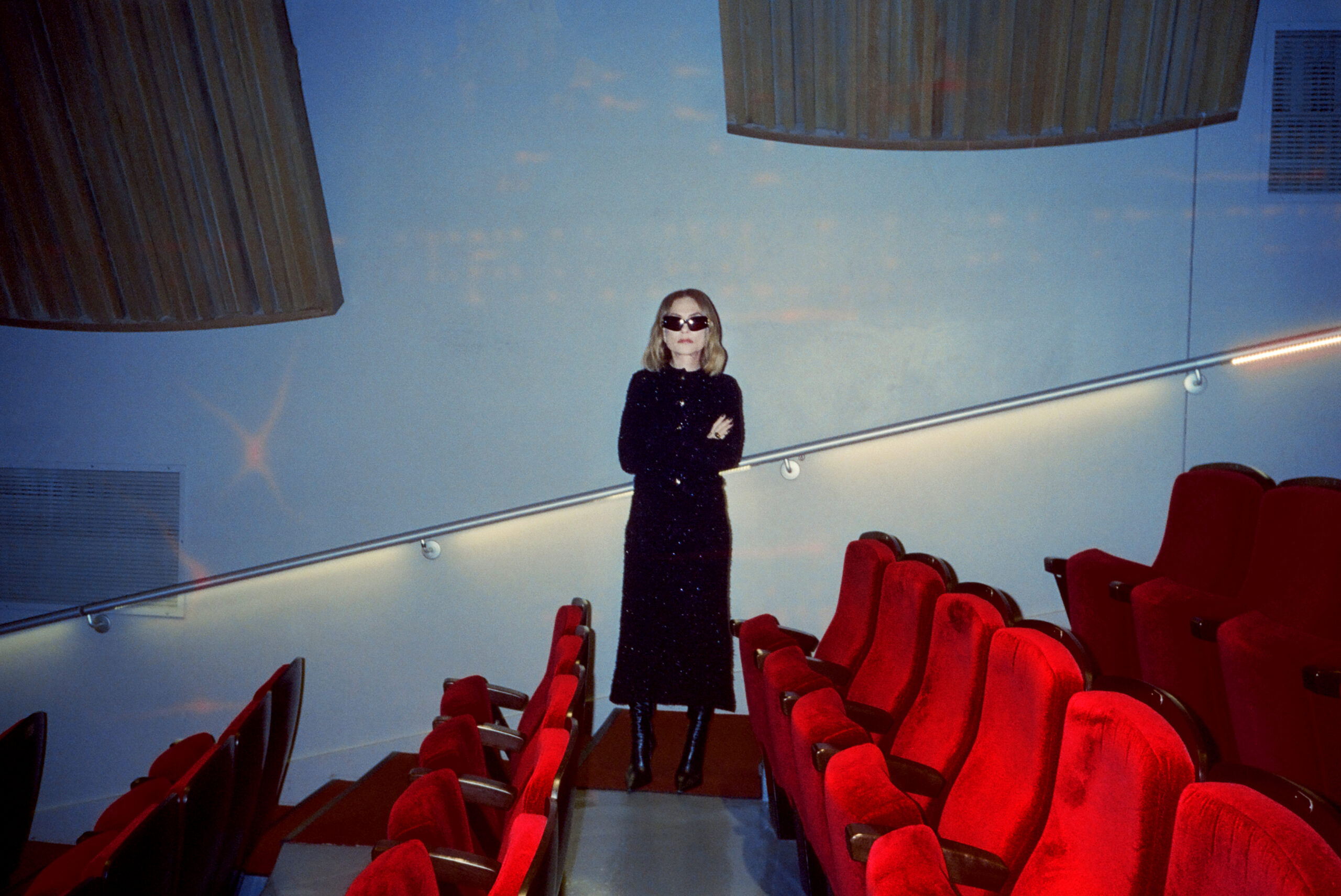
SCARABELLI: It reminded me of being really young and traveling alone for the first time and falling in love right away.
HUPPERT: Exactly.
SCARABELLI: You have this openness.
HUPPERT: Yeah, and with no fear. That’s also what’s very important. He never shows the foreign concept as something you should be afraid of or like it would be threatening. No, it’s immediately you are just engaged and people are engaged the same, and especially even more so in this film. She wants to create a really deep connection by getting involved in people’s lives. And so there was a kind of generosity, but with a certain mystery.
SCARABELLI: We’re not sure what she wants.
HUPPERT: Yeah. I love when she says goodbye to the couple and she starts walking. And at some point, she disappeared. The woman says, “But where did she go?” That’s why she’s a bit like a witch because she’s here and all of a sudden, like in a fairy tale, she disappears.
SCARABELLI: There’s an interesting line when the younger gentleman’s talking to his mother near the end of the film and she goes, “Why do you like this woman?” And he goes, “Because she lives her life sincerely.” I wonder if you have any interpretation of that. Is sincerity important to you as an actor?
HUPPERT: There are so many things you think about when you act. But yes, you certainly think about being as sincere as possible, but also as being visible and also invisible to create light and to create shadows. I don’t know if that always goes with being sincere because that’s what you want to project on the screen. You see things and you guess things also, it’s more like raising questions and it’s more interesting if you create a kind of ambiguity and complexity. And even for her at the end, you don’t really know who she is or exactly why she’s there. You haven’t got any answers to all these questions.
SCARABELLI: You used the words ambiguity and complexity. And I think that in this era, audiences sometimes have a harder time with ambiguity and complexity. You’ve played a lot of interesting roles in the past, you’ve been in a lot of controversial films. Do you think that now is a different time for cinema? Do you think people are scared to make more ambitious films in that regard?
HUPPERT: No, I don’t see any difference. I think over the past, there was a time where the line between the good and the bad were more defined. And for so much time now, you have potentially the possibility to be complex and ambiguous. And no, I don’t think that’s going to change.
SCARABELLI: You were just the jury president of Venice [Film Festival]. What were you looking for there, or what excites you today in cinema?
HUPPERT: Well, I was not looking for anything, I was just ready to be surprised. We had very good responses on that matter, I have to say. The variety of films was great and it’s always fascinating to see all these images and films from all over the world and this creativity which is so strong and which makes you believe that yes, cinema is still very much there and alive. Now, how to reach people, that’s a different story. In terms of inspiration, it’s certainly there, but we all know that it can be difficult to make people come out of their home and go to movie theaters. But as a media, it’s still very powerful. It was a great experience.
SCARABELLI: Are you seeing anything this week at the New York Film Festival?
HUPPERT: I saw the Leos Carax film [It’s Not Me] last night, that’s the only one I’ll be able to see actually, because I have to go back tomorrow night. I’m on stage right now with a play that I’m touring in Europe. And of course, I thought it was really extraordinary and refreshing. It’s really a heritage in the best sense. I thought [Jean-Luc] Godard was very much there, but it’s 100% a Leos Carax film. This kind of material makes me confident in cinema because one could think, “Well, the whole thing is 40 minutes and there is no story.” But you have so much more than that. I was very touched by the film.

SCARABELLI: Can you tell me a little more about the play that you’re doing right now?
HUPPERT: Yeah. We have a great Italian stage director in Europe called Romeo Castellucci, and I just did Bérénice with him, the [Jean] Racine play. This was a very special version of Bérénice because I’m mostly by myself, so it’s more like a monologue. I started doing it in Paris last year and it was quite controversial, which I like, because the images are really sometimes strong and disturbing. I did it in Milano because he has a theater in Milano. I did it in Lugano, and now I’m coming to Geneva. But next year in March, I’m bringing another production that’s very, very dear to me by Robert Wilson. It’s another monologue. I do a lot of monologues. I like to be alone on stage. It’s a monologue about Mary Stuart called Mary Said What She Said. It was a very big success in France and I toured it, more or less. I just did it in London at The Barbican, and now we’re taking it to the Skirball Theater for a week next March, so I’m really excited.
SCARABELLI: You’re busy. Last question, because I thought it was interesting what you just said. Why do you like being alone on stage?
HUPPERT: Well, I like having partners, too. In fact, I’m also doing The Glass Menagerie. That’s also a production that was three, four years ago already, staged by Ivo van Hove, who is a well-known director here. And we’re taking it to China in December for a few shows. Let’s say I’m not really alone, because especially in a play staged by Romeo Castellucci and with Bob Wilson, there’s so much going on. The lights, the noises, I move a lot. And you can be surrounded by your imagination and so many things going on when you do this. I never really feel alone. But people feel it. And of course, at the end, those shows are about loneliness, Bérénice’s loneliness and Mary Stuart’s loneliness. And the more you are out on the stage and the more you resent that loneliness, it works. But I like it. It’s exciting.
SCARABELLI: Perfect. Thank you so much for joining me.
HUPPERT: You’re welcome.

